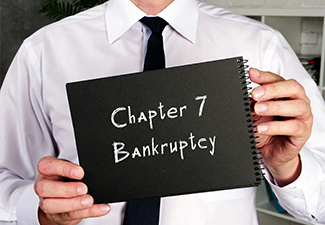How Does Chapter 7 Bankruptcy Differ From Chapter 11 and Chapter 13?
June 5, 2025
 Filing for bankruptcy is a legal step that can provide financial relief, but the differences between Chapter 7, Chapter 11, and Chapter 13 are significant and worth careful consideration.
Filing for bankruptcy is a legal step that can provide financial relief, but the differences between Chapter 7, Chapter 11, and Chapter 13 are significant and worth careful consideration.
Attorney Scott N Tisevich works with individuals and businesses to determine the most suitable path based on their specific circumstances.
Whether you're trying to recover from a personal financial crisis or seeking a way to keep your business operating while managing debt, understanding your options under bankruptcy law is critical.
Chapter 7 Bankruptcy: Liquidation and a Fresh Start
Chapter 7 bankruptcy is often called a straight or liquidation bankruptcy because it involves selling nonexempt assets to repay creditors. For many individuals, this can be the fastest way to eliminate unsecured debt.
Eligibility Requirements for Chapter 7
To qualify for Chapter 7 bankruptcy, individuals must meet certain income-based criteria:
Means test analysis: This test compares your income to the median income in your state. If your income is below the threshold, you typically qualify.
No recent discharge: You can’t file Chapter 7 if you received a bankruptcy discharge under Chapter 7 within the past eight years or under Chapter 13 within the past six years.
Non-dischargeable debts: Certain debts, like child support, alimony, most taxes, and student loans, generally can’t be wiped out under Chapter 7.
What Happens to Your Property
While bankruptcy exemptions allow you to keep certain essentials, nonexempt assets may be sold by a court-appointed trustee:
Exempt assets: These typically include your primary residence (within limits), a modest vehicle, necessary household items, and retirement accounts.
Nonexempt assets: These may include secondary homes, valuable collections, or high-value vehicles. These assets are liquidated to repay creditors.
Debts That Can Be Discharged
One of the key features of Chapter 7 is the discharge of most unsecured debts:
Credit card debt: Balances are usually wiped clean.
Medical bills: Generally eliminated.
Personal loans: Unsecured loans may be discharged.
Chapter 13 Bankruptcy: A Repayment Plan for Individuals
Unlike Chapter 7, Chapter 13 bankruptcy allows debtors to keep their property and repay debts over a structured period of three to five years. It’s often suited for individuals with steady income who can manage partial repayment.
How Chapter 13 Works
Chapter 13 is sometimes called the "wage earner's plan" because it relies on a repayment strategy tied to your income:
Debt reorganization: Your debts are consolidated into a single monthly payment managed by a trustee.
Payment duration: Depending on income, the plan lasts three or five years.
Debt discharge: Remaining unsecured debt may be discharged at the end of the plan.
Benefits of Choosing Chapter 13
For individuals who don’t qualify for Chapter 7 or who want to avoid asset liquidation, Chapter 13 has several advantages:
Keep your home: You can stop foreclosure and catch up on missed mortgage payments.
Protect your car: You may be able to restructure your car loan and avoid repossession.
Manage tax obligations: Certain back taxes may be paid over time through the plan.
Who Is Eligible for Chapter 13
Eligibility for Chapter 13 bankruptcy is based on the following:
Debt limits: There are maximum secured and unsecured debt limits that change periodically.
Regular income: You must have enough income to cover required living expenses and plan payments.
Filing history: There are restrictions based on prior bankruptcy filings.
Chapter 11 Bankruptcy: Business Reorganization and High-Asset Individuals
Chapter 11 bankruptcy is primarily used by businesses that want to remain operational while repaying creditors over time, but it’s also available to individuals with very large debts who exceed Chapter 13 limits.
The Structure of Chapter 11
Chapter 11 is significantly more detailed and involves court oversight of the debtor’s reorganization plan:
Plan of reorganization: The debtor proposes a plan that restructures debts, alters payment terms, and may reduce obligations.
Creditor vote: Creditors can vote to accept or reject the plan.
Court approval: A judge confirms the plan if it meets legal requirements and treats creditors fairly.
When Chapter 11 Is the Right Option
Chapter 11 may be appropriate in specific situations:
Operating businesses: Companies that need time to restructure contracts, leases, or debt while continuing to generate revenue.
High-debt individuals: Those whose debts exceed Chapter 13 limits but still want to avoid liquidation.
Asset preservation: Entities that want to retain valuable assets while reorganizing obligations.
How Chapter 11 Differs From Chapter 13
Though both allow debt reorganization, they vary in scope and process:
Nuances and cost: Chapter 11 is more costly and typically involves more court appearances.
Plan flexibility: Chapter 11 plans can be more customized, including terms for different classes of creditors.
Debtor control: The business usually continues operating under the debtor’s control as a "debtor-in-possession."
Key Differences Between Chapter 7, Chapter 11, and Chapter 13
Understanding the distinct differences among these three types of bankruptcy is important when considering which path to take.
Purpose of Each Chapter
Chapter 7: To discharge most debts quickly through asset liquidation.
Chapter 13: To create a structured payment plan that allows you to repay debts while keeping property.
Chapter 11: To reorganize debt and continue business operations or manage high personal debts.
Duration and Process
Chapter 7: Typically resolved in 3 to 6 months.
Chapter 13: Repayment over 3 to 5 years.
Chapter 11: Often lasts several years, depending on court proceedings and reorganization terms.
Who Controls Assets and Finances
Chapter 7: A trustee takes control of nonexempt assets.
Chapter 13: Debtor retains control, but makes regular payments to a trustee.
Chapter 11: Debtor generally remains in control as debtor-in-possession.
Credit and Future Implications
Filing for any bankruptcy will impact your credit score, but the type of bankruptcy and your actions afterward influence how long and how severely:
Chapter 7 stays on your credit report: For 10 years from the filing date.
Chapter 13 remains on your credit report: For 7 years from filing.
Chapter 11 duration on credit: Also typically 10 years.
Choosing the Right Bankruptcy Path
Deciding which chapter of bankruptcy to file depends on your goals, income, assets, and the type of debt you carry. Every option has its own process and requirements, and some paths make more sense depending on whether you’re an individual or a business owner.
Key Considerations Before Filing
Asset ownership: If you own property or vehicles you want to keep, Chapter 13 or 11 may be better options.
Income stability: A steady income is required for Chapter 13. If your income is low, Chapter 7 might be more suitable.
Business involvement: Chapter 11 is designed for operating businesses but can also be used by individuals with high-value assets.
Amount and type of debt: Some debts, like student loans and taxes, are generally not dischargeable and must be considered when developing a strategy.
Legal Support Throughout the Process
Bankruptcy laws can be difficult to understand without professional help. Working with an experienced bankruptcy lawyer like Scott N Tisevich can help you:
Review your financial situation: Determine which chapter you're eligible for.
Evaluate debt relief goals: Discuss long-term and short-term financial priorities.
Protect key assets: Explore exemptions and strategies to retain important property.
Contact Us Today
If you’re considering filing for bankruptcy, the Law Office of Scott N Tisevich, Esq is here to offer personalized legal support based on your unique financial situation. Whether you're leaning toward Chapter 7, Chapter 11, or Chapter 13, our firm can help you weigh your options and take the next step. We serve clients in Reno, Nevada, Churchill County, Lyon County, Carson City, Story County, Douglas County, and Las Vegas. Call today.
